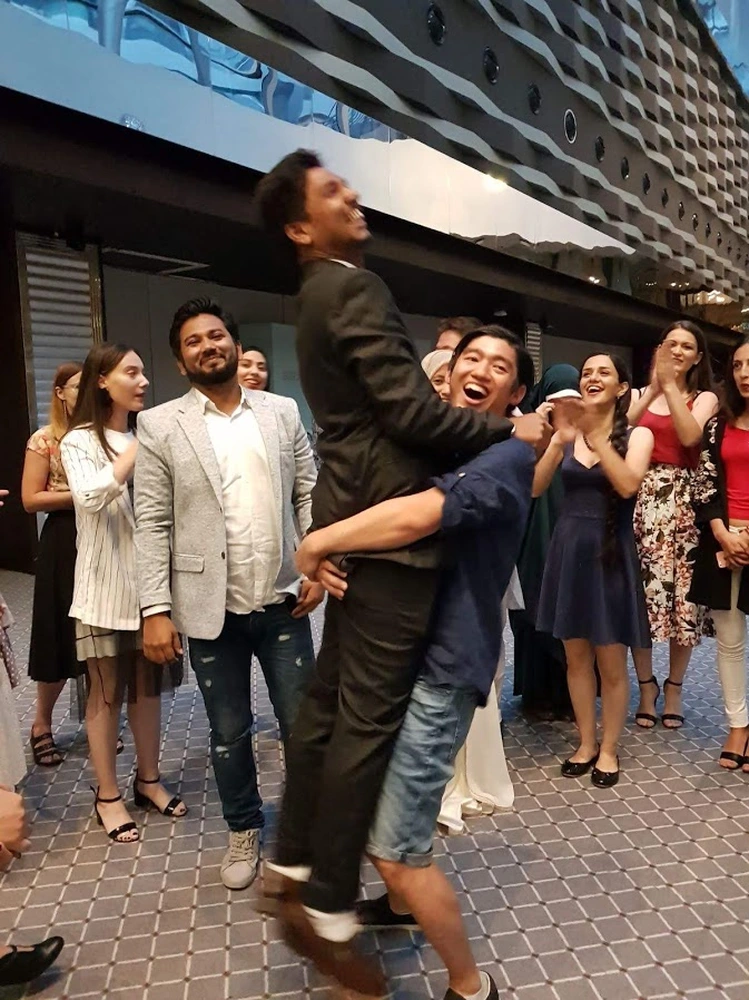
U of I students Ziheng Yin and Madina Azamova did something a little different in the summer of 2018: they took classes in Turkey.
Ziheng had taken Elementary Turkish with Dr. Ayse Ozcan, Director of the Turkish Program in the Department of Linguistics. During Ozcan’s online teaching year from Turkey, Ziheng came to Istanbul for a few days and met with her in 2016.
“Obviously, that short trip wasn’t enough for him and he wanted to go back for longer,” Ozcan said. She told him about a summer school there and he applied.
Prior to last summer, Madina already spoke some Turkish. “She was interested in Turkey and wanted to learn more about its culture and history,” said Ozcan, “so I told her about the culture intensive Yunus Emre summer school.”
Ozcan is working to build ties between the U of I and the Yunus Emre Institute, whose summer school is fully funded by the institution if students are selected.
“These study abroad programs help me recruit more students, so it’s beneficial for our enrollments, and makes Turkish studies more attractive to students. And, of course, it helps our program gain the visibility it deserves,” said Ozcan.
That’s especially true after a minor in Turkish was approved by the U of I Board of Trustees in January.
Ziheng Yin
Ziheng took classes at Ataturk University in Erzurum, Turkey city of some 367,000 inhabitants in eastern Anatolia (Asian Turkey). Madina studied at Muğla Sıtkı Koçman Üniversitesi in Muğla, a city of 840,000, in southwestern Turkey.
Ziheng arrived on the 15th of July and stayed at Erzurum for three weeks, with one extra week in Istanbul. He had been to Istanbul in 2016, but this was his first time in eastern Turkey. He was immediately struck by the city’s history. “It has been ruled by the Romans, Turks, Mongolians, and Armenians in different periods of time, and they left a variety of styles of architecture. It was amazing that I saw a Roman castle and a Persian monument within one block of each other!”
He also found its people friendly, and the city “very walkable, pretty safe and small.”
Classes were taught by the teachers assigned by the Yunus Emre Institution. Ziheng took a Turkish class at the B2 level, which is for learners who are fluent in Turkish. “The content is hard, even though I had been learning Turkish for two years,” he said. “All my classmates were better than me,” he commented, noting that many of them were also native speakers. In all there were more than 20 students from 17 different countries.
But he appreciated the quality of instruction. “I think I learned a lot being immersed in the language environment, and I improved a lot. Now I am comfortable in saying I’m fluent in Turkish.”
Ziheng recommends the experience to other U of I students. “It’s really beneficial for the students learning Turkish, or for people who are interested in another culture.
"What's more, the people attending this program are mostly elites from their own countries. You can build your social network or just make friends.”
His immersion includes the history of the country. “I define myself as a Turkish history specialist. When I was in the U.S or anywhere else, I hardly met people who had the same interests as me. However, in my summer school I got connected with a lot of historians and linguists from different countries.”
Madina Azamova
In July and August, Madina Azamova spent three weeks in Muğla and one in Istanbul. Upon arrival in Muğla, however, she was disappointed. “My first impressions when I arrived were: ‘Umm,..., where’s the beach? Where’s the sea?’ Apparently the shoreline is actually two to three hours away from the city of Muğla.”
But she soon found the people there to be “welcoming, warm and genuine.” And, “I loved having conversations with the locals there in Turkish, which significantly helped me improve my Turkish.”
She took classes at Muğla Sıtkı Koçman Üniversitesi. Her program is funded and sponsored by the university and the institute, which covers all costs, including Madina’s residence in Turkey, transportation, meals, and excursions to places within Turkey. She lived in a hotel.
Her classes met Monday through Friday and, because classes were intensive, were taught solely in Turkish. Madina was at the A2 (Beginning 2) level.
After classes, students went to lunch and excursions to museums or archaeological sites, or could explore the city and visit bazaars. And, mostly on weekends, they could go to the beach. Students hailed from countries such as Qatar, Sudan, Poland, South Africa, England, Lebanon, Somalia, Croatia, Serbia, Palestine, Italy, Germany, and Georgia.
Madina said the professors were “experienced and explained new vocabulary and grammar in Turkish, but in an understandable way.”
She said her week in Istanbul was mostly for exploring the city of 17 million people—visiting mosques, going to museums, etc.
Madina said she’d recommend the program to U of I students, regardless of major, “because anyone between the ages of 18-35 who’s enrolled in a four-year university or who has graduated from one can apply.” Students can be a citizen of any country, and at any proficiency level in Turkish.
Madina reflects, “I miss Turkey so much because my classmates…we became a family. We still have our group chat and keep in contact. I have friends literally over the world now.” She added, “What I’ll remember most is the generosity of the people in Turkey.”
And she vows that when she returns she’ll head straight to a place in Muğla called the Görgülü Café.
Why?
“Because their desserts were the most luscious I’ve ever had!”
To learn more about the Turkish program at Illinois visit: https://linguistics.illinois.edu/languages/turkish-program.
For details about how to minor in Turkish, contact Turkish program director Ayse Ozcan at: aozcan@illinois.edu.